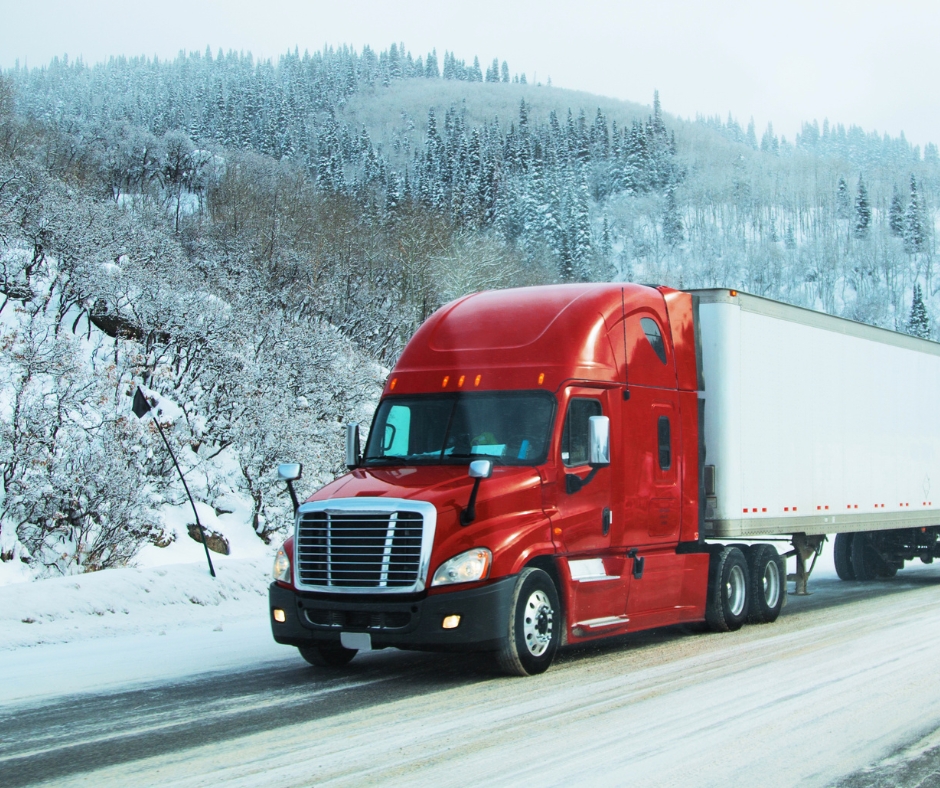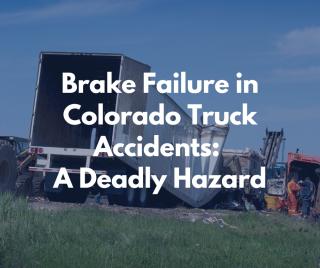"When you're hauling 80,000 pounds down I-70 and your brakes fail, you don't get a second chance—that's why training and maintenance are life-or-death issues on these roads." —
Mike Chaloupka, Truck Accident Lawyer, CDL Holder & Managing Partner at
Metier Law Firm.

Every year, Colorado's treacherous mountain passes become the scene of preventable tragedies. Families are devastated by one of the most overlooked dangers on our roads: brake failure in semi-trucks navigating steep, mountainous terrain. The consequences are catastrophic! When a
fully-loaded semi loses its brakes on a steep grade, lives are shattered in an instant, leaving behind grieving families and communities forever changed by preventable truck accidents.
The Growing Crisis: Brake Failure on Colorado's Mountainous Terrain
According to the
Federal Motor Carrier Safety Administration (FMCSA), brake violations consistently rank as the leading cause of out-of-service orders for commercial trucks nationwide. In Colorado, these violations transform from regulatory concerns into deadly hazards.
The state's mountain passes—particularly I-70, Vail Pass, and Loveland Pass—create perfect conditions for brake system failures. Steep grades, winding roads, and long descents push commercial vehicle braking systems to their absolute limits.
One of the state's most horrific crashes occurred when a runaway semi lost control while descending I-70 near Lakewood. With overheated brakes and missed runaway truck ramps, the truck became an unstoppable force—killing four people and injuring numerous others.
Why Brake Failure Occurs in Colorado Truck Accidents

Brake failure isn't random chance—it typically signals negligence somewhere in the operational chain. The unique challenges of Colorado's mountainous terrain amplify the consequences of cutting corners on maintenance or training.
Common causes include:
- Poor brake maintenance leading to system failure
- Improper technique (riding the brakes) on steep declines
- Overloaded trailers exceeding weight regulations
- Defective parts or inadequate inspections
- Air brake system malfunctions or disrepair
Any of these factors can transform an 80,000-pound commercial vehicle into an uncontrollable missile on a downhill grade.
Have you been injured in a truck crash involving brake failure on a Colorado mountain pass? Don't face this battle alone. Our experienced truck accident attorneys understand the unique challenges of mountainous terrain accidents. Call Metier Law Firm today at 866-377-3800 or visit www.metierlaw.com to schedule your free consultation.
I-70 Hazards: Colorado's Deadliest Mountain Corridor for Truck Accidents
The I-70 corridor isn't merely a vital transportation route—it's a
treacherous gauntlet for commercial vehicles with compromised braking systems. The stretch between the Eisenhower Tunnel and Morrison creates particularly challenging conditions for heavy trucks.
This section combines:
- Steep, extended descents
- Heavy traffic volumes
- Limited emergency stopping zones
- Extreme elevation changes
While Colorado has installed runaway truck ramps along this corridor, they're only effective if drivers can reach them before complete brake failure occurs. When systems fail catastrophically or drivers miss these safety features, the resulting crashes often involve multiple vehicles and severe casualties.
Real Victims, Real Tragedies: The Human Cost of Brake Failure
In 2019, a truck driver from Texas—unfamiliar with mountain driving techniques and ignoring multiple warning signs—lost control of his semi while descending I-70. After his brakes failed, he passed two runaway truck ramps before slamming into stopped traffic at catastrophic speed. Four people lost their lives.
Subsequent investigations revealed a perfect storm of negligence:
- Inadequate driver training for mountainous terrain
- An overloaded trailer exceeding weight restrictions
- Multiple brake system violations
This wasn't merely a mechanical failure—it represented a complete breakdown of responsibility that forever changed multiple families' lives.
If you or a loved one has been involved in a crash with a
commercial truck where brake failure played a role, taking immediate action is crucial:
- Seek immediate medical attention, even if injuries initially seem minor
- Document everything—photos, dashcam footage, witness information
- Avoid speaking with representatives from the trucking company or their insurance carriers
- Hire an experienced truck accident attorney familiar with Colorado's mountain roads and commercial vehicle regulations
- Request immediate preservation of the truck's electronic control module data, inspection logs, and maintenance records

At Metier Law Firm, we conduct comprehensive investigations using accident reconstruction specialists and FMCSA compliance experts to expose brake failure negligence. Time is critical in these cases—evidence disappears quickly on Colorado's mountain passes.
Don't wait—call us at 866-377-3800 or visit www.metierlaw.com today for immediate assistance with your truck accident case.
Legal Liability in Brake Failure Truck Accidents
Brake-related commercial vehicle crashes typically involve multiple potentially liable parties:
- The truck driver, for improper operation or failure to inspect
- The trucking company, for inadequate maintenance or training
- Third-party maintenance contractors, for negligent repairs
- Parts manufacturers, if brake components were defective
Colorado operates under a modified comparative negligence standard. This means your compensation might be reduced if you're partially at fault—but you can still recover damages as long as you're determined to be less than 50% responsible for the crash.
Our legal team fights aggressively to recover:
- Current and future medical expenses
- Lost wages and diminished earning capacity
- Pain and suffering compensation
- Wrongful death damages for surviving family members
Frequently Asked Questions: Brake Failure on I-70 & Colorado Truck Accidents
Why is brake failure particularly common on I-70 and other Colorado mountain roads?
The extended downhill stretches and high elevations of Colorado's mountainous terrain create intense heat and stress on brake systems, especially in trucks that are overloaded or poorly maintained. The I-70 corridor west of Denver drops over 5,000 feet in elevation across just 30 miles. Proper technique requires using engine braking and lower gears rather than constantly applying brakes, but many out-of-state drivers lack this crucial training.
What purpose do runaway truck ramps serve on Colorado's mountain passes?
Runaway truck ramps provide emergency stopping capability for commercial vehicles that have lost braking power on steep descents. Filled with soft material designed to quickly slow a vehicle through friction and resistance, these ramps are the last line of defense on I-70 and other mountain corridors. If a driver misses or fails to utilize an available runaway truck ramp, it significantly strengthens a negligence claim in subsequent litigation.
Can I pursue a lawsuit if the trucking company skipped required brake inspections?
Absolutely. Commercial carriers must adhere to strict FMCSA guidelines regarding inspection and maintenance. Documented violations of these requirements can significantly support your claim for damages.
What is the deadline for filing a truck accident claim in Colorado?
Generally, you have three years from the accident date to file—but don't delay. Critical evidence can disappear quickly in these cases, and prompt investigation is essential.
How does Metier Law Firm prove brake failure caused an accident?
We gather electronic control module data, maintenance logs, expert analysis, and witness testimony—just to name a few things, building a
comprehensive case that establishes clear liability for your injuries.
You Deserve Justice After a Colorado Truck Accident—Let Us Help
Brake failure crashes on Colorado's I-70 and other mountainous terrain are entirely preventable when companies follow required safety protocols. At Metier Law Firm, we combine technical understanding of commercial vehicle operations with decades of legal experience to hold negligent parties accountable for truck accidents.
Your case matters. Your family matters. Your recovery matters. Let our experienced
Colorado truck accident attorneys fight for the
maximum compensation you deserve after suffering from someone else's negligence.
Call Metier Law Firm today at 866-377-3800 or visit www.metierlaw.com to schedule your free, no-obligation consultation about your brake failure accident case.
Disclaimer: This blog is for informational purposes only and does not constitute legal advice. Always consult with an attorney from Metier Law Firm directly regarding your specific situation.



 Every year, Colorado's treacherous mountain passes become the scene of preventable tragedies. Families are devastated by one of the most overlooked dangers on our roads: brake failure in semi-trucks navigating steep, mountainous terrain. The consequences are catastrophic! When a fully-loaded semi loses its brakes on a steep grade, lives are shattered in an instant, leaving behind grieving families and communities forever changed by preventable truck accidents.
Every year, Colorado's treacherous mountain passes become the scene of preventable tragedies. Families are devastated by one of the most overlooked dangers on our roads: brake failure in semi-trucks navigating steep, mountainous terrain. The consequences are catastrophic! When a fully-loaded semi loses its brakes on a steep grade, lives are shattered in an instant, leaving behind grieving families and communities forever changed by preventable truck accidents.
 Brake failure isn't random chance—it typically signals negligence somewhere in the operational chain. The unique challenges of Colorado's mountainous terrain amplify the consequences of cutting corners on maintenance or training.
Brake failure isn't random chance—it typically signals negligence somewhere in the operational chain. The unique challenges of Colorado's mountainous terrain amplify the consequences of cutting corners on maintenance or training. At Metier Law Firm, we conduct comprehensive investigations using accident reconstruction specialists and FMCSA compliance experts to expose brake failure negligence. Time is critical in these cases—evidence disappears quickly on Colorado's mountain passes.
At Metier Law Firm, we conduct comprehensive investigations using accident reconstruction specialists and FMCSA compliance experts to expose brake failure negligence. Time is critical in these cases—evidence disappears quickly on Colorado's mountain passes.
